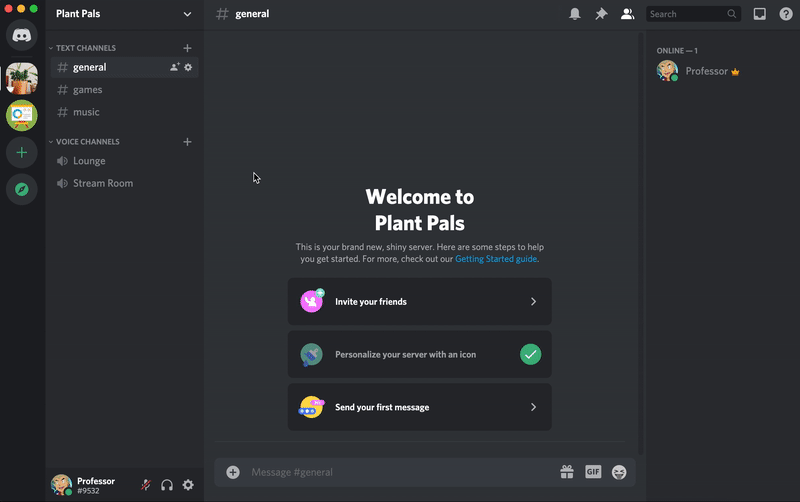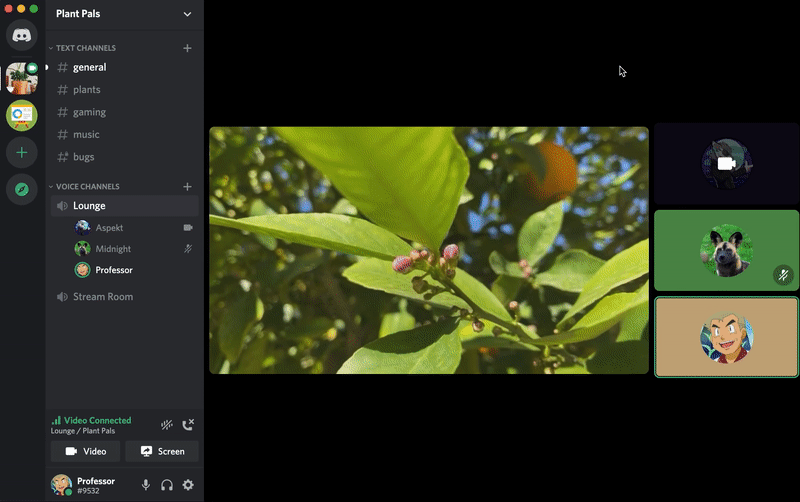Starting Your First Discord Server
A Discord Article & Guide from blog.discord.com
“Another group?” you mutter under your breath as the eighth Group DM with the same people appears in your chat list. You’re used to it by now — when a topic gets more in-depth, your friends make a new group chat for that subject.
Or perhaps you’re used to something else: your friends who talk as much as eight chats can hold, but all within *one* conversation, which makes catching up on the chat a job in itself.
Maybe you’re in the middle of one of these situations, or you know someone who could use good ol’ organization in their conversations. Or, you want to help guide a friend through creating their own Discord server!
This blog post will be around to help both you and your friends get off the ground, whether it’s learning how to make a server for the first time, showing how helpful a Discord server can be to many different types of groups, or explaining what a server even is.
So, let’s get started!
What Even IS a Discord Server?
If you’re looking for the textbook definition of a “Discord server,” it’s a place on Discord for groups of all sizes to talk in. But that doesn’t explain what makes a server special.
Think of it like this: A Discord server is like when all your best friends gather at your home to hang out. Sometimes a few are talking about the latest episode of their favorite show in one room, while others may be discussing a hike they adventured on over the weekend.
Everyone talks about different things, but no matter what conversations go on, you’re all there for one reason: you’re long-time friends who’ve been together through thick and thin.
In fact, that’s what a lot of Discord servers are about — people come from all sorts of different corners of the world, but no matter the distance, they can get together on Discord and talk about anything they’d like, with whoever they want.
So let’s get you set up with your own Discord server, where your friends can talk to your heart’s content without feeling lost in the many conversations going on at once.
That Sounds Wonderful! How Do I Start a Server?
First thing’s first: download the app for your computer or smartphone at discord.com/download. Alternatively, you can access Discord on any computer you can use a web browser on, without having to download an app, at discord.com/login.
Once your account is set up and you’re signed in, you’ll see a green + (Plus) button on the left side of the app. Choose that, and you’re on your way to making a new home.
You’ll then be asked what the server’s about. Depending on what your answer is here, you’ll be given a different set of starter channels to talk in. More on what channels are later.
In the example below, we’ll use the “Friends,” template, but feel free to pick which one works best for you.Hit that green button and your journey begins!
Next, the most important part of any server or group: The name. No matter what our friend group chats about, we all have one thing in common: we love houseplants. Let’s call it… “Plant Pals.”
If anything ever happens or you’ve left the houseplant lifestyle for greener(?) pastures, you can always change the server name and icon later on.
Aaand you’re done! Your new home for you and your closest friends is ready to roll. But it’s missing something important… your friends!
My Server’s Ready! How Can I Invite My Friends?
Now that you have a new space to move into, it’s time to get your friends to join you. Right in the middle of the chat window, you should see a big “Invite Your Friends” button. Hit that, and you’ll see the option to either invite your friends directly or share an invite link.
If it’s not there, you can always invite friends through the invite button in the server’s drop-down menu on the top-left, as shown in this example below:The drop-down menu will let you create an invite, so long as you’re allowed to by the server owner.

After inviting friends and sharing your invite link, soon everyone will be gathered in your shiny new server.
What Are These “Text Channels” and “Voice Channels?”
In your new server, you’ll see a few lists called “Text Channels” and “Voice Channels.” These are where you and your friends will be talking in all sorts of ways.
Text channels behave similarly to how you may send messages on other platforms. They’re where you send messages to your friends, share photos, files, or one song stuck in your head. You can even type out someone’s using name starting with an “@” and they’ll be notified, such as “@Fern.”
Every channel has a name associated with it and holds its own chat history. You can think of a channel name as the conversation topics for that channel. For example, in a text channel named #general, you’ll talk about anything and everything that’s on your mind, while a channel called #plant-talk could be best suited for showing off that newest ficus.You’d think there would be plenty of plants by now, but they always seem to buy more and more…
By default, when you make a new channel, everyone will be able to see and post in it. It’s like making a new group to talk in, without having to re-add everyone all over again like you would in a normal Group DM.
Voice channels are part of what makes Discord special. Remember when we compared a Discord server to having all your friends over? Voice channels are what make this possible.
Click on a voice channel and you’re placed in a room to talk with your device’s microphone. Unlike Direct Messages, users in a server won’t be startled by a ringtone when you join the voice channel. It’s like walking into a room with your friends and joining their conversation!

Voice channels also allow you to use your device’s camera to see your friends for a video chat. You can also share your device’s screen to show your friends how good you got on that one game, or how complex your plant watering schedule is.
You can have an unlimited amount of people in a voice call at once, and up to 25 people video chatting at the same time. Up to 50 people can watch someone’s shared screen.
How Can I Add or Remove New Channels?
When we made our “Plant Pals” server, the “Friends” template we used included channels called #general, #gaming, and #music. Since we’re big into houseplants, our friends want a place where we can focus on talking about and sharing tips on taking care of our plants. So, let’s make a channel for that!
To make a new channel, head into your server’s drop-down menu on the top-left and select “Create Channel”. It’s the same menu you used to make an invite! If you’re on mobile, slide to the right to open your channel list, tap the server’s name and choose “create channel.”
Making a new channel is as easy as typing up a name for it!
From there, a menu pops up letting you customize your channel. We’ll be making a text channel for this, so choose “Text Channel” and give it a name. Let’s keep it simple and call it “#plants.”
Aaaand that’s it! A new place has been planted to talk about your ferns, fauna, and flowers to your heart’s desire.
How Many Channels Should I Have?
When creating more channels, it’s best not to get crazy with the channels — if you’re just starting out with your server, you’ll want to get a feel for how your friends use them. To keep things comfy without overwhelming others, we recommend starting off with a small number of channels and adjusting your channel selection as time goes on.
Let’s think about our new #plants channel: “plants” itself is a pretty broad subject that can result in many different topics within that to discuss. Certain conversations, such as “what pot should this fern be in?” will likely be talked about, answered, and moved on after a short period. There’s no need to make a whole channel called #what-pot-should-this-fern-be-in.A small number of channels is a good place to start. Expand as needed, but don’t go overboard.
Servers can be pretty flexible — you can always add a new channel when you want, and you won’t have to reinvite your friends each time you make a new channel.
You can also delete channels when you don’t need them anymore, but once a channel deleted, everything within it is gone for good. Be sure to make 100% certain you want to delete the contents of a channel before it’s gone — sometimes keeping an unused channel around is better than deleting it outright.
Can I Limit Channels to Just a Few Friends?
Sometimes, as the owner of your snazzy new Discord server, you may want to keep certain channels only visible to a few friends. When it’s time for your friends to talk about how insects can be beneficial to your garden, some of your friends may be a bit averse to suddenly seeing pictures of snails, spiders, and slugs.
To help, you can designate a channel to be only a Private channel, only accessible to specific members and roles you decide. Roles can be pretty powerful tools for larger servers, so for now, we’ll stick to specifying exactly who we want within our small friends server.
As you’re making a channel, you’ll see an option to make a Private channel. Toggle that on, and hit Next.
 In addition to members, you can also limit channels to specific roles if you’ve decided some are necessary.
In addition to members, you can also limit channels to specific roles if you’ve decided some are necessary.
From here, specify who should see the channel, and hit “Create” Channel! You’ll see a brand new channel pop up, and if it’s a Text Channel, a list of the members who can see it.
If someone ever wants to be added or removed from a private channel after it’s already made, you can right-click on the channel (or long-press on mobile), select “Edit Channel” and head to Permissions, which is where you can adjust who can see that particular space.
Now You’ve Got a Growing Home for Your Closest Friends
Now that you’re all set up in your server, go on and have fun! Hang out in a voice channel, post adorable photos of cute pets next to your growing ivy plant, or wave hi to each other in a video call, no matter where you may be.
Your server is what you make of it.![]()
 Like chug jug says, your new server is pretty s l e e k if we say so ourselves.
Like chug jug says, your new server is pretty s l e e k if we say so ourselves.
If this blog post was helpful to get yourself off the ground, or you want to explain what makes a Discord server so unique to someone, we encourage you to share this blog post with anyone who could benefit from this. You can also leave a comment if it really helped!
Sometimes, what was originally planned as a small server can grow to be much bigger than anyone expected. If your server is growing to the point where you’ll need more guidance, we plan to release another blog post (very soon!) on what we consider the best practices for growing communities on Discord — we’ll link it here when it’s out.
And of course, if you have any more in-depth questions, our Help Center is always available, along with our Twitter page. Shoot us a Tweet at @discord if you need a quick pointer or two.
Last updated